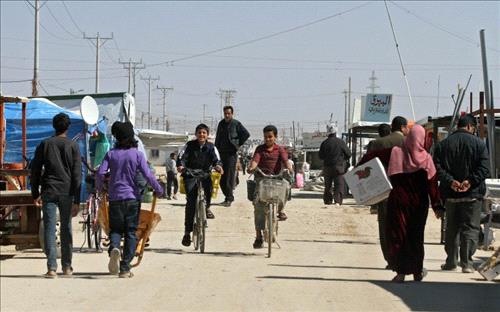Ammon News - AMMONNEWS - International aid continues to fall short of what Jordan needs to host 1.4 million Syrian refugees, Jordanian officials reported, saying the number represents the equivalent of the United States hosting 60 million refugees.
With no end in sight to the Syrian conflict, now in its fifth year, officials are calling the situation critical. So far this year, Jordan has received only 7.2 percent of $2.9 billion needed for services to Syrian refugees and host communities.
Planning Minister Imad Fakhoury urged the international community to do its part, warning the country may have to restrict entry to Syrians if the crisis increases unemployment and poverty among its own citizens.
Syrian refugees now make up 20 per cent of the kingdom’s population, Fakhoury said. However, only about 630,000 Syrians are registered with the UN refugee agency, he added.
“You can count on Jordan, but please don’t leave us alone in that effort,” Fakhoury said at the end of a recent visit by six UN agencies to view the situation on the ground.
“If we are left alone, then we will have to make very difficult decisions about our national security with a priority to our citizens, and the world can’t blame us,” he continued.
Today, Jordan is the world’s third-largest host of refugees, including some 208,000 Iraqis in addition to Syrians, Palestinians, Yemenis, Libyans, Sudanese and Somalis.
In March, the Assembly of the Catholic Ordinaries of the Holy Land urged the international community to “intervene in alleviating the desolation” of Syrian refugees in their “desperate situation.” It also expressed concern over cuts in support provided by humanitarian groups, including the international Catholic aid agency, Caritas, due to a lack of funds.
“Our projection is around $17 million and, for the first quarter of the year, we have received about 50 percent of this amount,” Omar Abawi, emergency program manager of Caritas Jordan, said.
“But compared with 2014 and past years, it’s a real gap because it was more than 50 percent” at this time, said Abawi. “Funding for health services have yet been received as planned.”
As of February, Caritas Jordan had helped more than 91,000 Syrian refugee households, the equivalent of nearly 452,000 individuals, who had registered with the Catholic relief organisation since the start of the Syrian conflict in 2011. Caritas works solely among the majority of Syrian refugees who live in Jordanian communities and not those sheltering in UN camps where they already receive UN assistance. There are numerous other Church-related agencies assisting Syrian refugees in Jordan, both in the community and in the camps.
Such cuts to services by the UN and charities include reducing the amounts provided for food assistance vouchers or eliminating them entirely. Also, refugees must now pay for health care that was once provided free to Syrian refugees by the Jordanian government.
UN agencies have limited aid to the neediest among the refugees, leaving many without basic subsistence.
Although some 80 percent Syrian refugees live outside U.N. camps and in Jordanian communities, more are moving into the camps. There, they no longer have to pay rent, and they have access to some free medical services. Still, others have gone back to war-ravaged Syria, despite the enormous danger as a result of ongoing fighting.
Jordan, a resource-poor Middle Eastern country, has never been fully compensated for its assistance to refugees from all of the region’s conflicts over many decades, Fakhoury said.
Last year, only 37 per cent of the $2.3 billion requested for humanitarian assistance in Jordan was received, and that’s been one of the highest percentages ever received.
Jordan’s Information Minister Mohammed al-Momani said his country’s economy and security have been negatively impacted by the protracted conflict in Syria. Jordan’s military also bears the sole responsibility of protecting the 235-mile border between the two countries, he told reporters.
“The lack of a political solution to the Syrian crisis has a cost and will continue to increase until there is a political solution,” said Edward Kallon, the UN resident humanitarian co-ordinator in Jordan.
“The Syrian crisis is a global security threat and provides the highest caseload of refugees worldwide,” Kallon added.
Jordan is one of five host countries for nearly four million Syrian war refugees.
*Catholic Herald
